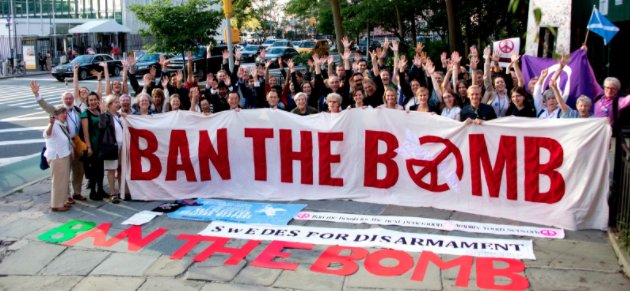ICAN Wins The Nobel Peace Prize: What Does This Mean for Women?
By Marina Kumskova, WILPF Women, Peace and Security Programme Associate
International Campaign to Abolish Nuclear Weapons is preparing for the negotiations on the adoption of the Treaty on the Prohibition of Nuclear Weapons. (Photo: ICAN)
The International Campaign to Abolish Nuclear Weapons (ICAN) has been awarded the 2017 Nobel Peace Prize, recognising its role in achieving the Treaty on the Prohibition of Nuclear Weapons. WILPF, an active member of ICAN’s International Steering Group, is honoured to be part of this movement to ban nuclear weapons, the most destructive explosive devices ever created with catastrophic humanitarian, environmental, and economic effects. On top of all of this, these weapons have a disproportionate impact on women and girls.
Recognising that the majority of Nobel laureates are men, Beatrice Fihn, the Executive Director of ICAN, highlighted that “the issue of nuclear disarmament has been led and inspired by women because men have only made decisions to bomb cities.” Women have been at the forefront of the anti-nuclear resistance since the beginning of the nuclear age. Indeed, the Nobel Peace Prize and the prohibition of nuclear weapons is something that women’s groups should celebrate. WILPF has been part of the hibakusha campaign , indigenous test survivors and antinuclear activists from around the world. We have worked with our members, with partners and with governments to develop the nuclear ban treaty through activism, advocacy and diplomacy.
Now, it is time for Member States to take a step towards disarmament and effective conflict prevention. The issues of demilitarisation and disarmament - including nuclear disarmament - should be recognised as part and parcel of broader Women, Peace and Security (WPS) prevention efforts. All Member States, including the Friends of WPS, should step up and sign the nuclear ban as part of broader commitment to prevention and women’s leadership. After all, prevention is one of the four pillars of the WPS Agenda and critical for sustaining feminist peace.
Read WILPF’s official statement on ICAN receiving the Nobel Peace Prize here>

